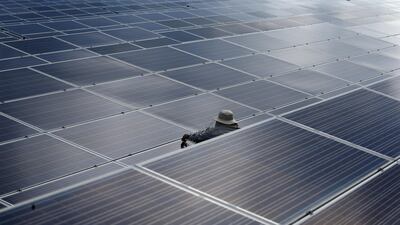Acwa Power International plans to spend US$4 billion on renewable energy projects next year, with plants to be developed in Dubai, Jordan, Egypt and Morocco, its chairman Mohammad Abunayyan said.
Acwa Power will use project financing for the plants, with 80 per cent of the cost to come from debt and the rest equity, Mr Abunayyan said in Riyadh. Developers usually pay the upfront costs of renewable energy projects and then get paid by the output generated.
Nations are investing in solar and wind energy to cut down on pollution from fossil fuels and to take advantage of reduced costs. In the Middle East, there is the added incentive to produce more alternative energy for domestic use and export more crude oil. Funding for the clean energy industry surged 40 per cent in the third quarter to $66.9bn compared with the same period last year, according to a report by Bloomberg New Energy Finance.
____________
Read more:
Saudi companies turn to the sun as a hedge
World’s cheapest prices submitted for Saudi Arabia’s first solar project
Egyptian solar industry wins $1.8bn investment for 29 new projects
____________
Saudi Arabia plans to develop 30 solar and wind projects over the next 10 years as part of a $50bn programme to boost power generation. Wind in the kingdom could produce at least 15 gigawatts of power, Mr Abunayyan said.
Riyadh-based Acwa, started in 2004, owns conventional power, renewable and water desalination assets across the Middle East as well as projects in nations including Vietnam and South Africa. Its shareholders include the Saudi Public Pension Agency and the World Bank Group’s International Finance Corp.
Acwa Power is expecting to list shares through an initial public offering in the third quarter or fourth quarter of next year, Mr Abunayyan said. The company has been considering an IPO since at least 2011.

